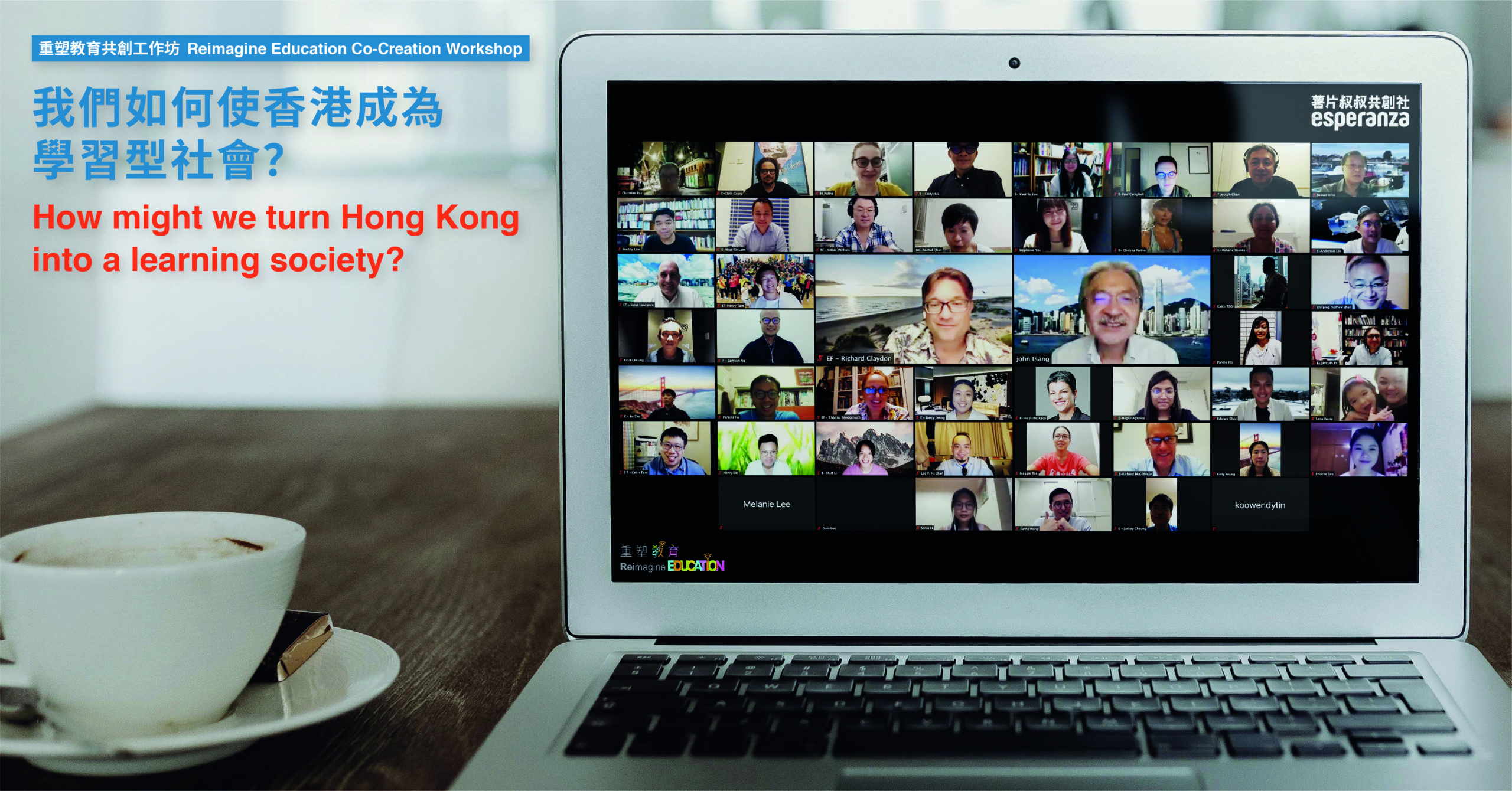
Esperanza kicked off the “Reimagine Higher and Continuing Education’ discussion with an online co-creation workshop with members of the Esperanza community on 27 July. Participants identified the barriers to lifelong learning and suggested some ideas on how we could turn Hong Kong into a learning society.
Setting the Scene
Oscar Venhuis, Co-Founder of theDesk, facilitated an opening dialogue with John C Tsang (Founder of Esperanza) and Dr Richard Claydon (CEO, roundPegz). John pointed out that longevity, together with the exponential growth of knowledge, makes the three-stage life concept no longer tenable. There will be a constant need to reskill, upskill and acquire new knowledge. Policy makers need to rethink how education resources should be redistributed throughout a person’s life span.
The pandemic has accelerated the demand for a more digital savvy workforce, with many jobs replaced by automation. In addition to digital skills, John and Richard emphasized that soft skills like problem solving, collaboration, agility, critical thinking, leadership and resilience are also very important. For Hong Kong to become a learning society, it must pay appropriate attention to developing holistic abilities in STEM, Arts, Humanities and Sports (AHS), as well as future-ready leadership.
Richard underlined the fact that Hong Kong is competing with other cities for talents, especially with the two developed yet resource-light multicultural cities in APEC in the next few decades – Singapore and Dubai. All three cities need to be or become digital knowledge economies to remain relevant to international businesses and investors. This requires educating local talent to the highest levels of future-readiness and attracting overseas talent to fill in the gaps. Singapore and Dubai have already greatly invested in the improved education of their own citizens into more future-ready forms. Hong Kong has to play catch up.
On the positive side, Richard believes Hong Kong has huge amounts to offer that its competing cities do not. It has a better climate, is geographically more advantageous, has a far more liberal lifestyle, and extensive financial resources to invest. It has also been identified as the most likely place on the planet for Western and Eastern philosophies of thought to mesh into a powerful whole. Participants identified the following key barriers to lifelong learning:
Barriers
Potential Solutions
The participants came up with some initial ideas on how different stakeholders could address the barriers:
- We should change the discourse on lifelong learning to learning for life.
- Government needs to invest more in lifelong learning and reallocate education resources at different life stages. Hong Kong is well positioned to develop itself as a laboratory to test next generation educational techniques and products.The government should facilitate the development of Hong Kong as an edtech hub.
- Employers should be given financial incentives (e.g. tax deduction) to invest in talents. It is important to develop a learning culture with peer-to-peer learning. Staff should be offered incentives to pursue continuous learning. The introduction of ESG (Environment, Social and Governance) compliance by the HK Exchange could be a push factor for businesses to treat employees as a valuable asset. Staff development should be one of the KPIs of companies.
- Education institutes should offer courses that address the needs of the 21st century and there needs to be greater diversities in terms of subjects (e.g. applied sciences, arts, humanities and sports) and format (e.g. cross-disciplinary and collaborative learning, online and micro-learning modules, formal vs informal learning). Schools should nurture soft skills (e.g. curiosity), a self-discovery and lifelong learning mindset from a young age. Teachers and parents should be given the support to enable them to become good role models for younger people.
- There is a need to change the culture of the society. The meaning of education should be redefined and so is the value of lifelong learning. Education (and teachers) should be given more recognition and prestige.
Next Steps
To conclude, John said the change should start with all of us as individuals. Different stakeholders should work together to provide a conducive environment for learning. The government can play a vital role.
The inputs of the co-creation workshop will inform the design and discussions of a webinar on Reimagine Higher and Continuing Education to be organised by Esperanza together with a few other local and international education institutes at the end of September.
